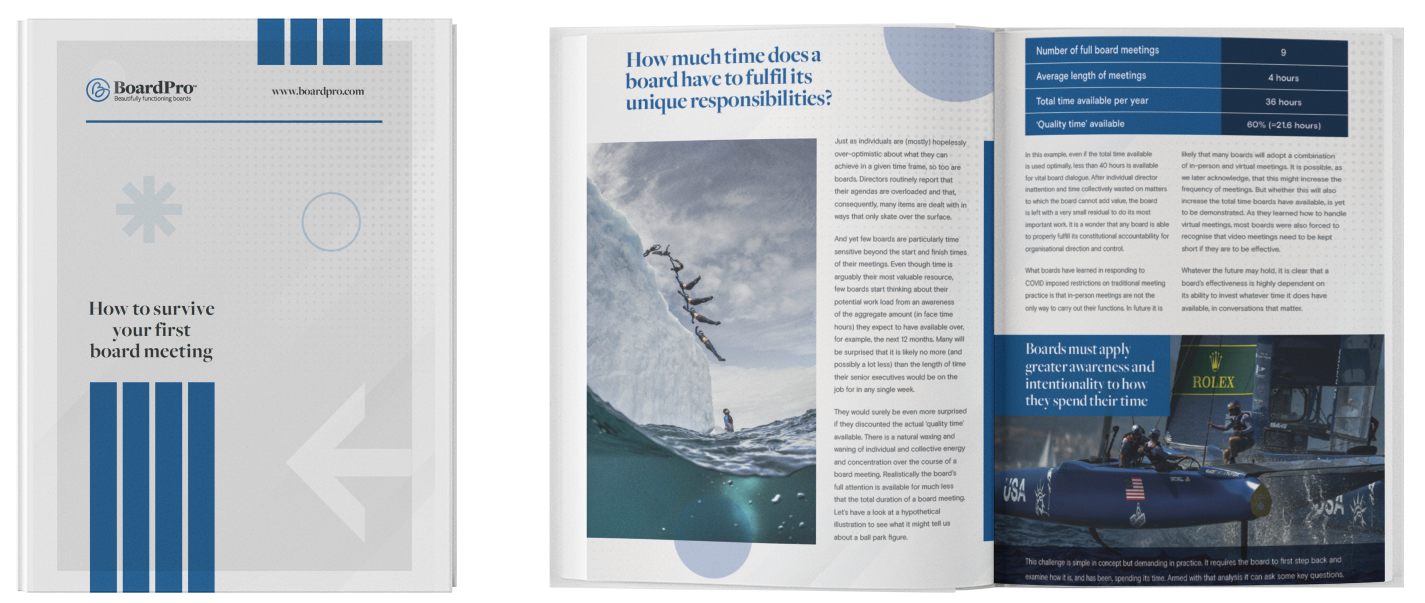10 things to ask yourself before joining a board
It is important to exercise due diligence when joining a Board and approach your newest venture with equal parts enthusiasm and inquisition. Be sure to ask yourself and your potential Board lots of questions before finalising your new position. Both you and the CEO and/or chair of the Board you are hoping to join have cause to rigorously screen each other, as Boards are increasingly seen as responsible for their organisation’s performance and regulatory compliance. The Board will be looking for potential new directors with integrity and drive, and you should be looking for an opportunity that matches both your desired trajectory and professional values. Paul P. Brountas states in Boardroom Excellence: A Common Sense Perspective on Corporate Governance that “what is needed is a proactive CEO whose message resonates throughout the corporation and instills all employees with the resolve to help create a corporate culture that nourishes integrity and ethical behavior, penetrating all aspects of the corporation’s business and governance.”
Paul P. Brountas states in Boardroom Excellence: A Common Sense Perspective on Corporate Governance that “what is needed is a proactive CEO whose message resonates throughout the corporation and instills all employees with the resolve to help create a corporate culture that nourishes integrity and ethical behavior, penetrating all aspects of the corporation’s business and governance.”
Unsure where to start when approaching a new Board? Whether you are hoping to become a new director or a contributing member, here are ten questions you can ask yourself before signing on:
- Who else is on the Board? Are they capable and trustworthy, and do they continually prioritise their role as a Board member and the Board’s work? Does leadership have a track record of reliability and efficiency, and have they fostered a healthy relationship both with and amongst the other Board members? What is the workplace culture, and do you want to become a part of it? Do not go into an organisation whose values significantly clash with your own morals, thinking that you will be able to effect change from the inside and completely overhaul the company’s culture.
- What will your introduction to the Board look like? Does the Board provide training and an allotted time in which to integrate? Has regular workplace development occurred for long-term Board members, allowing them to advance professionally and hone their skills? Are reviews taking place on time? Is there an annual governance action plan in place, and is the Board following it.
- Does the Board have a set of cultural values and behaviours that it has defined as a guiding principle of its existence? Are these beliefs put into practice in the everyday workplace culture of the organisation? Is this true beyond the Boardroom at all levels of the company?
- Does the Board’s work inspire you? Are you passionate about its goals? There is a lot to be said about the value of working on something you genuinely enjoy. No matter which Board you choose to join, it will inevitably go through trials and errors; in these moments, your commitment will depend on your personal investment in the vision of the organisation. Do not waste both the Board’s and your own time working on something about which you feel indifferent.
- How much time will your new role take up, both initially and as you adjust and progress in the Board? Will you be reimbursed for your time? Be sure to think about commutes and work outside of the meetings themselves when considering this factor.
- Is the Board’s interest in you based on specific expertise that you bring to the table beyond the regular responsibilities of its members? Would your background and personal skillset be valued and applicable to the mission of the organisation?
- Is there a shared vision for the company’s future held among not only Board members but the entire company? Does the company have a feasible plan to achieve this goal? Are they moving in a direction you agree with, and is this change taking place at a rate you are comfortable with?
- How open is the Board to taking risks, and does this align with your personal risk philosophy? Do you consider their approach to be pragmatic and healthy, and would you feel comfortable with the pace of their environment? What are the top five strategic risks for this Board/organisation, and how are they currently navigating these? Are they open to change?
- s the company transparent in its practices, particularly in their delegation system? Are tasks delegated in a fair manner, and is there a clear, manageable set of matters reserved for Board members? Is there an unequal valuing of labour, or are all company members recognised for their contributions and delegated tasks in a way that, in keeping with this practice, avoids burnout or overburdening of particular employees?
- Is the organisation transparent when it comes to its track record, and what does that track record say about the company's health (including finances, all relationships with stakeholders etc.)? A lack of information is a red flag when it comes to your potential Board’s integrity.
How to survive your first board meeting - Download our free eBook
Share this
You May Also Like
These Related Stories

So you want to be a board director

Why Joining a Board Could Be the Career Boost You've Been Looking For



